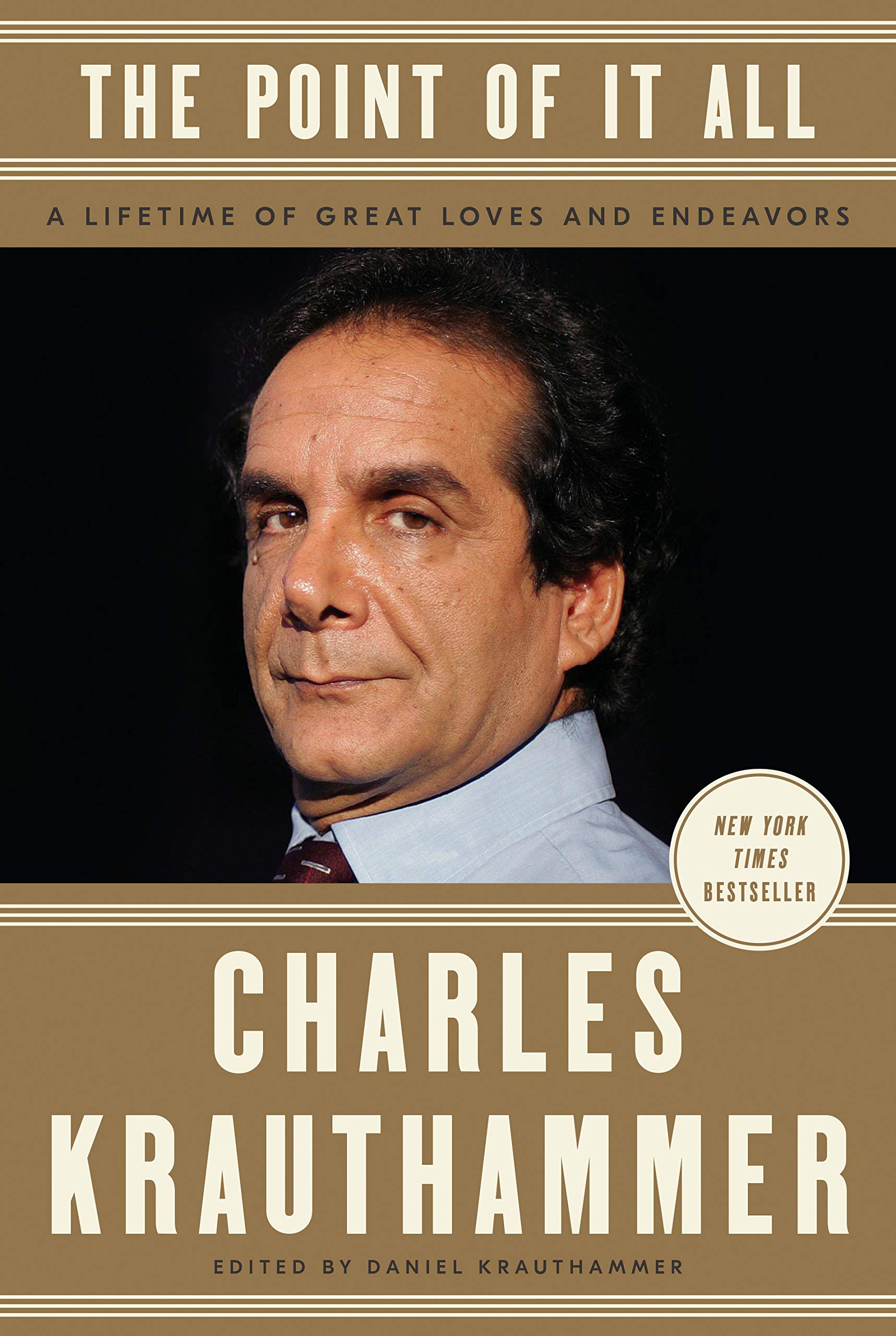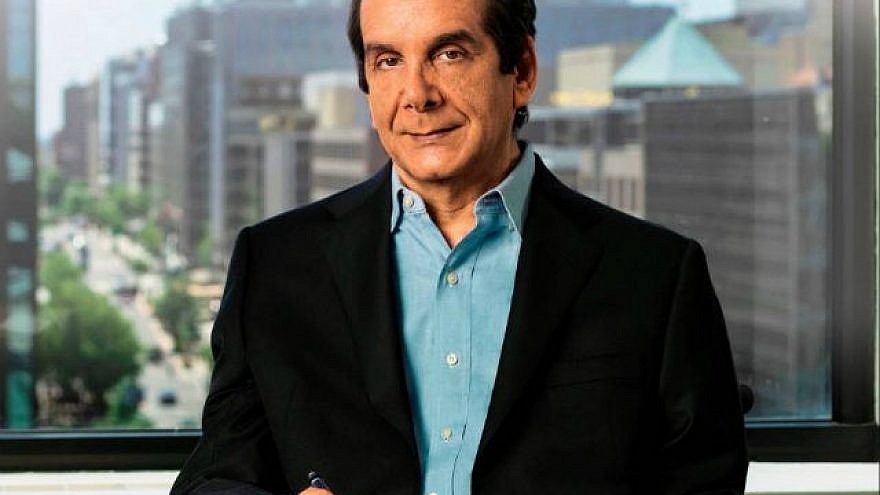One of the biggest media personalities who passed away in 2018 was Jewish conservative intellectual and pundit Charles Krauthammer.
Shortly before his death, he instructed his son, Daniel, to finish his second book that, like his 2013 New York Times bestseller Things That Matter: Three Decades of Passions, Pastimes and Politics, would be another collection of his best writings.

One of the 18 chapters over the five sections is titled “The Two Last Tribes of Israel,” consisting of five columns in no chronological order. (There are Israel-related columns in other sections, including one column titled “The Iranian ‘Moderate.’ ”) They exemplify his stalwart support for the Jewish state, in addition to his eloquent observations of the Jewish community—past, present and future.
Below is an overview of a few of those memorable columns.
‘The Miracle, at 60’
The first, “The Miracle, at 60,” is about the six-decade anniversary of the State of Israel’s independence and how—despite “the norm, the rule for every ancient people defeated, destroyed, scattered and exiled”—the Jewish people have not only survived, but have preserved their way of life, including Hebrew as their official language.
Despite defying conventional wisdom, Krauthammer writes, Israel faces an adversarial trend: “During its early years, Israel was often spoken of in such romantic terms. Today, such talk is considered naive, anachronistic, even insensitive, nothing more than Zionist myth designed to hide the true story, i.e., the Palestinian narrative of dispossession.”
While Krauthammer acknowledges the suffering of the Palestinian people, he does not give its “fanatical leadership” a pass—“from Haj Amin al-Husseini, the grand mufti of Jerusalem (Nazi collaborator, who spent World War II in Berlin), to Egypt’s Gamal Abdel Nasser to Yasser Arafat to Hamas of today—that repeatedly chose war rather than compromise and conciliation.”
He adds that for the most part, the Palestinian narrative is heard in international circles and the media, blaming Israel for its suffering, as opposed to what Israel has faced since winning independence at “a very high cost” with 6,373 perishing, or in “American terms, it would take 35 Vietnam memorials to encompass such a monumental loss of life.”
Krauthammer concludes that while the Arab-Israeli conflict is “complex,” the “root cause is not.”
“On the day the Arabs—and the Palestinians in particular—make a collective decision to accept the Jewish state, there will be peace, as Israel proved with its treaties with Egypt and Jordan,” he says. “Until that day, there will be nothing but war. And every ‘peace process,’ however cynical or well meaning, will come to nothing.”
The conflict remains unchanged. This article was timely when it was written, and it is timely now.
‘Victimhood cannot be the foundation stone of Jewish identity’
During a Democratic presidential primary debate in March 2016 between former Secretary of State Hillary Clinton and Vermont Sen. Bernie Sanders, CNN anchor Anderson Cooper, the moderator, asked the latter why he didn’t speak much about being Jewish.
Sanders replied that “I am very proud to be Jewish,” and that the Holocaust eliminated his father’s family. He proceeded to explain growing up and seeing survivors with camp numbers tattooed on their arms.
“I am very proud of being Jewish, and that is an essential part of who I am as a human being,” he added.
Krauthammer writes about how this episode has the background of Sanders being thus far the most successful Jew to run for the nation’s highest office, and that in doing so embodies the encouraging state of American Jewry.
With that progress comes a dire warning, Krauthammer writes: Whereas American Jews would most likely identify themselves as Orthodox, Conservative or Reform, some people such as Sanders are categorized as descending from Holocaust survivors. While understandable, Krauthammer says, it dilutes the meaning behind one’s Judaism.
“The memories created are indelible. And deeply valuable,” he writes. “Indeed, though my own family was largely spared, the Holocaust forms an ineradicable element of my own Jewish consciousness.”
“But I worry about the balance,” he continues. “As Jewish practice, learning and knowledge diminish over time, my concern is that Holocaust memory is emerging as the dominant feature of Jewishness in America.”
“I worry that a people with a 3,000-year history of creative genius, enriched by intimate relations with every culture from Paris to Patagonia, should be placing such weight on martyrdom—and indeed, for this generation, martyrdom once removed,” he added.
While Krauthammer notes that he is not criticizing Sanders and credits him for being genuine, he expresses concern that diminishing Jewish identity to the Shoah, as much as it’s crucial to preserve its memory, has adverse consequences for future generations.
“There must be balance. It would be a tragedy for American Jews to make the Holocaust the principal legacy bequeathed to their children,” he writes. “After all, the Jewish people are living
through a miraculous age: the rebirth of Jewish sovereignty, the revival of Hebrew (a cultural resurrection unique in human history), the flowering of a new Hebraic culture radiating
throughout the Jewish world.
“Memory is sacred, but victimhood cannot be the foundation stone of Jewish identity. Traditional Judaism has 613 commandments,” he continues. “The philosopher Emil Fackenheim famously said that the 614th is to deny Hitler any posthumous victories. The reduction of Jewish identity to victimhood would be one such victory. It must not be permitted.”
The end of the book consists of the eulogy Daniel Krauthammer gave at his father’s funeral. It’s too long to describe in this article, but it’s recommend reading about what his father meant to him (and to dedicated readers everywhere) through not just his unparalleled intellect, but also his love for his family and others as he attempted to lead an exemplary life, about which he expressed gratitude for in his final column.


























